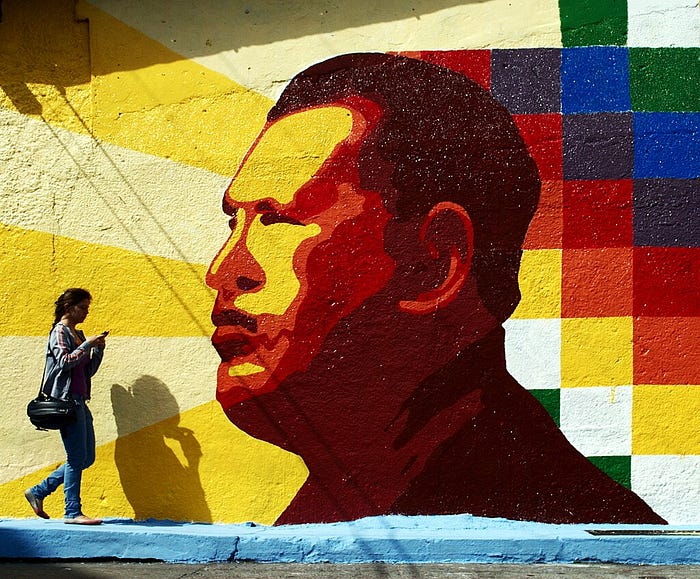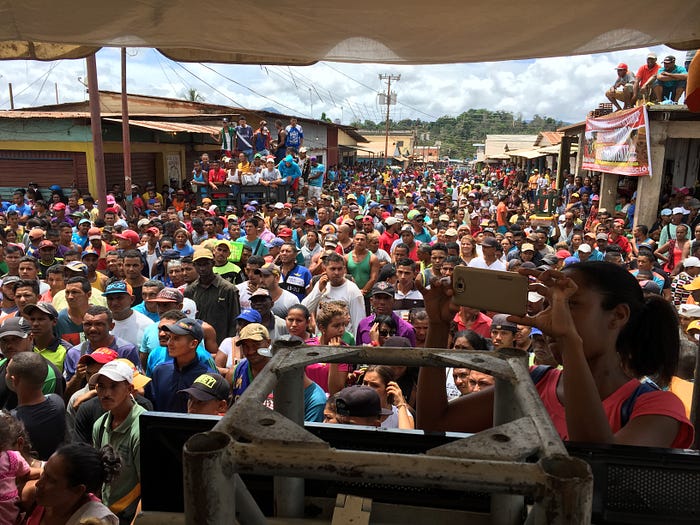WRITING PROMPT | SOCIETY | CRISIS
I became familiar with the political evolution of Venezuela during roughly twenty years of visiting and working there. The things I saw and heard echo my country's societal changes. It is deeply ironic, considering the combative trajectory of Venezuelan politics was inspired by an anti-capitalist aspiration for its society.
When Hugo Chavez won the 1998 presidential election in Venezuela, he had plenty of 'street cred' behind him. He was known to be a feisty scrapper, having tried in 1992, as an army Lieutenant Colonel, to lead a coup d'etat and was imprisoned when his efforts failed. Only by a presidential pardon was he free to try again, this time, successfully, through the ballot box.
He tapped into the discontent of many Venezuelans left behind in the oil boom that should have lifted all boats but did not. Up to this point, the two biggest political parties were tired and static, trading off power every few elections in a predictable ritual. The ordinary people languished, and their dreams of an upwardly mobile life were fiction. Chavez channeled their disenchantment and reflected their origins: a simple man, unacquainted with political decorum, always speaking in the vernacular, seeding his speeches with slang and buzzwords he knew would connect him to the masses.
I first began living in Venezuela, on and off, from the time of his release from prison and through his rise into effectively perpetual presidential power, which was extinguished only by his untimely death from cancer.
I watched the progress of his rule and his intense hold on the imaginations of his adherents, including some of my friends, co-workers, and the family who would, years later, become my in-laws.
His administration was always a flurry of activity, bringing both changes I saw as positive and negative and those that were a mystery. Vacant farms held by absentee moguls would be seized and gifted as farm plots for poor people. Then, somewhat incongruously, I would see the video of Chavez ringing the opening bell at the Dow Jones Stock Exchange. He was challenging to make sense of. I always suspected he wasn't quite sure himself, at least at first.
Slowly, however, his manner became sharper as his sweeping plans to remake the country came into focus. Blindly loyal acolytes accumulated around him, and the capacity to assert his will grew. The opposing parties were continually off balance, unable to match the audacity and rapid-fire shouted pronouncements from his quarter of the political landscape. It was like all the oxygen would get sucked out of any discourse once he arrived to wield his opinion.
Catchphrases and pointed jokes became the handle by which people grasped his proclamations and repeated them endlessly. Demeaning nicknames were invented for his adversaries, such as the opposition's candidate in the 2000 special presidential election, Francisco Arias Cárdenas. He was christened frijolito (little bean). It struck me as the sort of taunt most of us leave behind when we move on from middle school.
In a subsequent presidential election, against a different opposition candidate, he blew off holding a debate. He knew well enough that defending his policy decisions was uninteresting and that his supporters didn't care anyway.
Enemies appeared everywhere. It was stunning to watch a nation that had no previous conflict with any other suddenly announce a list of nations that wished to sabotage the cherished Bolivarian Revolution. My country was on that list.
It didn't concern me too much. I still had my job, and no one hassled me at the airport or military checkpoints. Occasionally, I would hear it, some word or phrase, spoken not to me but about me, but nothing to my face. Venezuelans are a cheerful lot, always making jokes, so I took it that way.
It was strange, therefore, when the famous Venezuelan comedian Er Conde del Guacharo ceased his wildly popular impressions and lampooning of Chavez on TV. The joking can only go so far.
I realized the trouble the country was getting into when I saw the sign taped up on the side of a store. It was from some governmental body I had never heard of before. It called for 'concerned citizens' to look for suspicious behavior around their neighborhood that might indicate sympathy with the 'enemy.'
The billboards of Chavez got bigger and bigger. It seemed nothing was more patriotic than painting his face on the wall or wearing a red hat and t-shirt (the color of Chavez's political party, the PSUV). The nation's flag was modified, gaining one star to make eight in total (the additional star symbolized the 19th-century liberator, Simón Bolívar). Anyone waving an old flag wasn't on the right side of history.

Chavez, a self-proclaimed common man, hated the elites (except those powerful business magnates who fell in line to exploit the situation for maximum profit). Each year, more of the middle and upper class would flee overseas, and he was happy to see them go off to Miami or wherever, as long as they weren't around to sully his socialist paradise. During elections, Venezuelan consulates in places where the diaspora was the largest mysteriously could not facilitate absentee voting.
I heard many personal stories of families and friends divided by politics. Not the normal arguments, but the I'm-never-speaking-to-you-again kind. I never got into it anymore when visiting family. Being a gringo, everyone knew where I was likely to stand.
There was even a movie made of the social breakdown, an analogy about two families who supported rival Venezuelan baseball teams and how they could not stop attacking each other over which team was better. It was supposed to be a comedy, but it felt all too real.
Aló Presidente (Hello President) was a program broadcast every Sunday. It was Chavez's opportunity to speak his mind. Literally about anything. For hours. Rambling speeches that essentially had no substance but were designed to entertain and keep the memory of his glorious deeds in their heads forever. And remind them of who their many enemies were.
Finally, posters went up that gave evil a face, usually that of Uncle Sam committing some crime or being strangled by the righteous hands of socialism. I began wondering where this was all ultimately heading. I was annoyed when I stopped by my father-in-law's house one day and saw one on the dining room wall. I knew it wasn't up there to taunt me, but it bothered me to see how negative and dogmatic the propaganda had become and how no one seemed to realize it anymore.
I sometimes entered conversations with people I knew, some quite well, who wholeheartedly supported Chavez. Then I would ask if they believed some wild conspiracy theory he had just announced on live television. Something that should embarrass a serious, thinking adult. That was often met with ambivalence and a shrug. Maybe he was serious, maybe not. Does it matter? I reminded them that he had changed the constitution to allow his own indefinite reelection. Did they really want this and only this, forever?
But what might happen tomorrow seems distant and unimportant when people see what they want handed to them today.
Things began to fall apart economically. We were all told it was due to either the imperialist powers outside or the traitors within. Chavez found a new friend in Putin, a strong, fearless leader who was the kind of guy Venezuela could count on. Someone he could understand. I once met with a Russian company to which the government had granted many concessions and incentives. I expressed surprise that they had cut through so much bureaucracy in such a short time. The CEO looked at me with a knowing smile, saying, "We know exactly how to do business here."
Nothing could be agreed upon between the Chavistas and what remained of those who disagreed with his revolution (derided with the nickname esquálidos, meaning scrawny or emaciated). The political sides were in two different worlds now, existing with entirely separate narratives. It became impossible to conduct my work because the governmental ministries my company had to deal with ceased functioning in any real way. They served only as comfortable offices where political appointees sat, unqualified to do their jobs except for declaring loyalty to the great leader. I would already be marked as an adversary if I walked in the door.
When Chavez was diagnosed with a never-disclosed form of cancer, he accused his 'enemies' of causing it. Not just his cancer but that of two other left-leaning world leaders at the time. It was a vast conspiracy, and I used to think it was the craziest I had heard of. Used to. No evidence was given, though the culprit was insinuated to be the US government.
People everywhere operate on similar psychologies, regardless of tradition or religion. Any one of us can have a strong opinion about a leader or the condition of our country, one founded on careful observation and understanding of risks for the future. But when a leader's charisma shines too brightly, people become subservient to emotional triggers and lazy allegiance.
I would not attempt to compare the details of Venezuela's twenty-five-year political experiment with what social conditions exist in the USA today. The starting premise was very different, with many resounding cultural differences. But I've seen enough of both to recognize points at which they meet.
It would be a fascinating study if I had less at risk personally in either country. Watching how the political right and left, in the hands of a sufficiently egomaniacal handler, are monsters that would instantly recognize each other.
Thank you to the editors Lucinda Munro Cook and Maria Garcia of A-Culturated for accepting my publication. This article is in response to the November writing prompt,
The prompt is timely for our moment in history and worth writing about!


